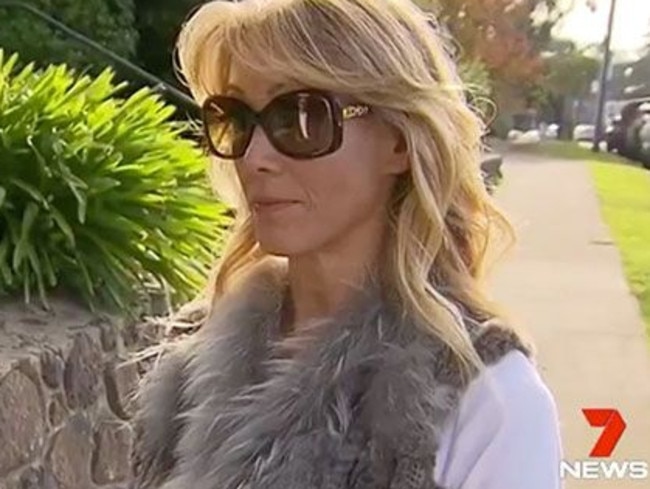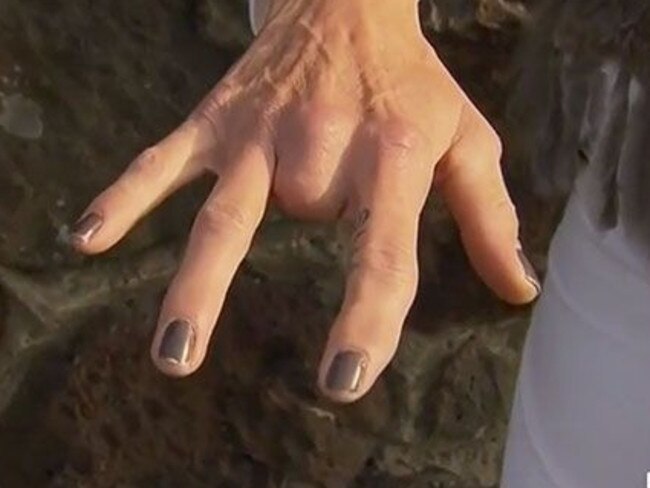Rita Panahi: Courts are still failing violated women
A FORMER AFL player terrorised a woman and maimed her with a blowtorch. His pathetically lenient sentence shows courts are still far too forgiving of violent men, writes Rita Panahi.

Rita Panahi
Don't miss out on the headlines from Rita Panahi. Followed categories will be added to My News.
- Domestic violence the Left won’t touch
- We can’t toy with domestic violence
- Feminists: Tackle issues that damage women
EVEN by the low standards we’ve come to expect from the Victorian judiciary, the sentence handed down to former AFL player Justin Murphy earlier this month was pathetically lenient.
Here was a man who had terrorised his former partner, Jill Scott, with a campaign of harassment, stalking and threats before attacking her with a blowtorch.
The victim suffered burns so severe that she lost her middle finger. She has not only been maimed for life but also has psychological scars that will haunt her for years to come.
“I’ll have flashes for life, dreams for life,” Scott told Seven News. “I wake up screaming.
“Evil. That’s pretty much the word for it.”


So, what sentence did Murphy, who in the past has pleaded guilty to theft and drug charges, receive for this heinous series of offences committed against Scott?
Ten years? Five years? No, Murphy copped a pitiful six-month term for systematically terrorising and maiming a woman.
The Victorian government has made violence against women a top priority, devoting billions to fighting the insidious incidence of abuse that saw 71 women killed across Australia in 2016. Close to 80 per cent of those deaths were due to domestic violence.
@RitaPanahi @theheraldsun Was a weak prick on the field. Clearly even weaker off it
— Campbell brown (@Browndogg_30x) May 19, 2017
Deserves a longer sentence for what he did to his GF. Men who terrorise or abuse women both physically and psychologically are Cowards. https://t.co/8aArMWxYyP
— Dean Rioli (@DeanoRio) May 18, 2017
But what sort of a message is sent when a brutal act of domestic violence is treated so forgivingly by the courts?
Murphy pleaded guilty to 28 counts of abuse and harassment. He’ll be released before the end of the year for that litany of offences.
He should have got more than six months for the stalking, robbing and threatening to kill Scott, never mind the frenzied attack with a blowtorch last November during which Murphy burnt off her finger.
But Magistrate John O’Callaghan saw fit to give the former Carlton, Essendon, Geelong and Richmond player a sentence well below the maximum available to him.
Time for prayers and hashtags is over

Magistrate O’Callaghan characterised Murphy’s conduct as a “campaign of terror” and said: “I cannot accept violence against women. I cannot accept this campaign of terror you put this lady through.”
But then he gave him a sentence that most of us outside the judiciary would see as manifestly inadequate.
On the one hand, we have myriad programs — some good, some absurd, including Respectful Relationships aimed at children as young as four — to tackle the scourge of domestic violence. But, on the other hand, the government does nothing to address the inadequate sentences handed out to abusers.
How can we send a message that violence against women won’t be tolerated when those guilty of the most horrendous brutality are given lamentably lenient treatment from the courts?
The sentences are a fraction of what they’d get if the offenders committed fraud against a bank.
Only in the eyes of the judiciary is white-collar crime considered more heinous than devastating acts of violence.

IT would be welcome if the government introduced minimum mandatory terms for violent attacks against women by cowardly thugs.
How many more cases of abuse followed by soft sentences do we need to endure before the government acts to restore some confidence in the system?
If we want battered women to go through the trauma of the courts, then we have a responsibility to ensure they are not victimised again by a system that seems to be hopelessly broken.
Making little boys feel guilty about being born male is not the answer to violence against women.
Domestic violence is too important an issue to be corrupted by activists pushing radical gender theories.
Teaching children from preschool to VCE that every boy is a potential predator and every girl a victim and that “masculinity” is inherently evil is neither helpful nor rational. Some in the media even thought to blame the horrific events of last week on toxic masculinity rather than the root cause of global terrorism: radical Islam.
The predictable response to the Manchester bombing from the Left’s jihadi deniers was to obfuscate and minimise the impact of Islamist terror by listing all the other ways people can die.
It’s a routine that must be deeply offensive to the victims of terror. Can you imagine if domestic violence was dismissed as a mere irritant that kills relatively few people every year?

Imagine if after a fatal incident of domestic violence, elements of the media sought to minimise the impact of violence against women by pointing out that far more people die from accidental poisoning in Australia.
As if that makes the dead women any less dead.
Acts of brutality, whether Islamist terror or domestic violence, must never be excused or diminished.
We must show enough respect for victims to tackle the root causes of violence and hold those guilty fully accountable.
Drug use and mental illness cannot be used to shift culpability.
Murphy has previously pleaded guilty to separate theft and drug charges and on both occasions was treated with great compassion by the courts.
Instead of having convictions recorded against his name, he was put on a diversion program and given a good-behaviour bond.
He has repaid that kindness by causing untold pain and suffering against an innocent woman, who will forever bear the scars of his brutality.
— Rita Panahi is a Herald Sun columnist



